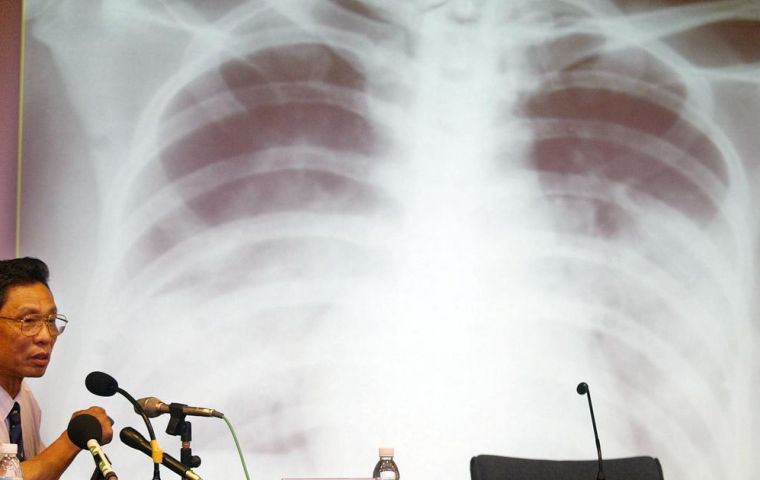MercoPress. South Atlantic News Agency
More cases in China of a mystery viral pneumonia; fears of a resurgence of SARS
 News of the mystery pneumonia outbreak led to speculation that it might be linked to Severe Acute Respiratory Syndrome, a highly contagious respiratory disease
News of the mystery pneumonia outbreak led to speculation that it might be linked to Severe Acute Respiratory Syndrome, a highly contagious respiratory disease China on Friday confirmed more cases of a mystery viral pneumonia that has sparked fears about a resurgence of SARS, the flu-like virus that killed hundreds of people more than a decade ago. The 44 cases, up from the initial 27 announced on Tuesday, include 11 “severe cases”, health authorities in the central Chinese city of Wuhan said in a statement.
“The vital signs of the other patients are generally stable,” the statement said.
The authorities are still in the process of identifying the cause of the infection, but “influenza, avian influenza, adenovirus infection and other common respiratory diseases have been excluded”, the Wuhan health commission said on Friday, without mentioning SARS, which is caused by a coronavirus.
News of the mystery pneumonia outbreak earlier this week led to speculation online that it might be linked to Severe Acute Respiratory Syndrome, a highly contagious respiratory disease.
Wuhan police on Wednesday that said they had punished eight people for “publishing or forwarding false information on the internet without verification”.
The health commission said all patients have received treatment in isolation and the city was tracking people who had come into close contact with the patients.
Some of those being treated work in a seafood market in the city, and “no obvious evidence of human to human transmission” has been found so far, the commission said.
Two women in Hong Kong were taken to public hospitals with fever and symptoms of respiratory infections or pneumonia symptoms, bringing the number of reported cases in the city since Dec 31 to five.
The two women, aged 12 and 41, had been to Wuhan in the past two weeks, the Hong Kong Hospital Authority said. They are being treated in isolation and are in a stable condition.
The city's Centre for Health Protection (CHP) said epidemiological investigations revealed some of the patients in Wuhan were business operators at a local seafood market.
The CHP has advised people to “maintain strict personal, food and environmental hygiene” in Hong Kong and while travelling. “When travelling outside Hong Kong, the public should avoid visiting wet markets, live poultry markets or farms,” it said in an advisory, adding that members of the public should also wear surgical masks and seek medical attention if they present symptoms.
The World Health Organization (WHO) criticized China for under-reporting the number of SARS cases following the outbreak in 2003.
SARS killed 349 people in mainland China and another 299 in Hong Kong that year.
The virus, which infected more than 8,000 people around the world, is expected to have originated in the southern Chinese province of Guangdong, according to WHO.




Top Comments
Disclaimer & comment rulesCommenting for this story is now closed.
If you have a Facebook account, become a fan and comment on our Facebook Page!